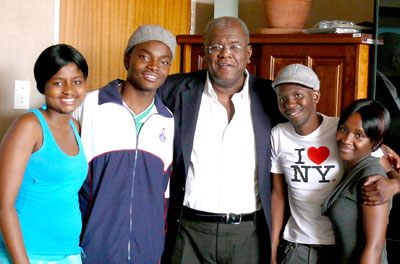Prof. Jansen welcomes students in Leadership Programme back on campus
 |
| Prof. Jonathan Jansen, Rector and Vice-Chancellor of the UFS, with Lebohang Molefe, Thabiso Nkohli, Kgotso Maya and Samkelisiwe Zulu. |
The Rector and Vice-Chancellor of the University of the Free State (UFS), Prof. Jonathan Jansen, was pleasantly surprised by what the first-year students who went to the United States on a Student Leadership Programme told him on their return.
“I am so happy that these students’ views on life in general have changed for the better in such a short period of time. This trip to the USA has certainly made a big impact on their lives. I sincerely hope that they will use the opportunities offered by the UFS to study even further,” said Prof. Jansen during his recent visit to the Qwaqwa Campus where he met with students who went on a two-week US tour earlier this month.
“The trip to various universities, like the New York University, the Cleveland State University, the Mount Holyoke College, the Cornell University, amongst others, made us to be proud South Africans. We were encouraged by the patriotic spirit displayed by American students and we are confident that UFS students, black and white, can start spreading that to the entire country,” said Kgotso Maya, a BA student majoring in Sociology.
The five students were part of the leadership programme exclusively designed for first-year students.